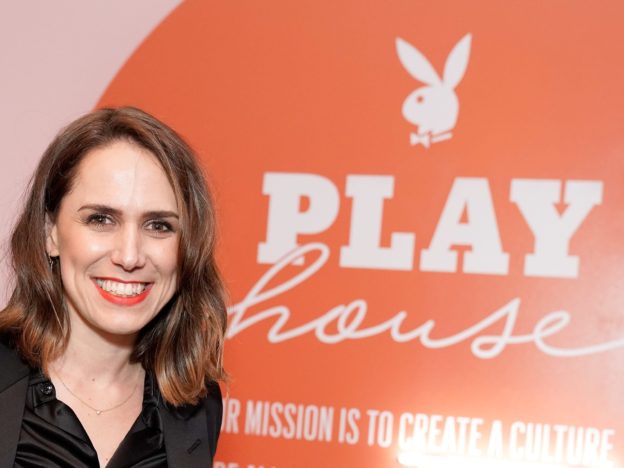Playboy is launching an NFT art gallery and auction hub via Nifty Gateway.
Playboy’s chief brand officer Rachel Webber said NFTs present ‘an enormous business opportunity’.
Playboy plans to use the partnership to showcase its art archive and to release original works.
See more stories on Insider’s business page.
Playboy is set to join the growing list of companies launching non-fungible tokens, through a partnership with Nifty Gateway, a popular online marketplace for NFTs.
The company, famous for its magazine and iconic bunny logo, told Insider it plans to use the partnership to showcase its art and photography archive and to release original works from artists on Nifty’s blockchain marketplace.
“We see the digital asset revolution as an enormous business opportunity,” Rachel Webber, Playboy’s chief brand officer and president of corporate strategy, told Insider. “We see huge growth potential in integrating tokens into our streetwear business, our live experiences, and events, creating a social token economy with our network of talent.”
An NFT is a cryptographic token that exists on the blockchain and can represent real-world items, such as art, music and real estate. Each token represents a unique digital item and cannot be interchanged with one another.
NFTs have soared in popularity in recent months, amid the rise in bitcoin prices and as a string of famous artists, musicians, and companies have leapt on the trend. More than $1 billion was spent on digital assets in March alone this year, according to data from CryptoSlam.
Playboy joins a growing list of media organizations launching NFTs. In just the last month, Forbes sold an NFT of its Winklevoss twins issue cover for $333,333. Time Magazine sold four of its covers as NFTs, fetching around $446,000 in cryptocurrency. Associated Press sold an NFT artwork for around $180,000, and The New York Times auctioned an article from columnist Kevin Roose, which raised more than half a million dollars for charity.
While Playboy is probably best associated with provocative centerfold images and the famous Playboy mansion, over the last 67 years the magazine company has also showcased works from iconic artists — from Pablo Picasso to Andy Warhol, and Salvador Dali to LeRoy Nieman. The walls at Playboy’s Los Angeles head office walls are lined with a 5,000-piece art collection, Webber said.
LeRoy Neiman contributed illustrations to PLAYBOY for 50 years beginning in 1954. His work included a series of travel paintings for the “Man at His Leisure” franchise
Playboy
“In the first issue of Playboy magazine, there’s this line, ‘Picasso, jazz, Nietzsche, and sex, those are the four ideal conversation topics for any sophisticated person’,” Webber said. “Right in the core of Playboy’s DNA is appreciation for art and for great artists.”
Through Nifty Gateway, individuals will get the chance to explore Playboy’s archive through an online art gallery and auction house. Playboy will also use the platform to continue incubating and commissioning new artists.
Playboy is currently working on launching NFTs with crypto artists including Blake Kathyrn and Slimesunday. Most of its NFT art drops will also contribute a percentage-of-sale donations to organizations supporting gender, racial, and sexual identity equality, Webber said.
Beyond art, Playboy’s NFTs could extend to interviews or a ticket to a virtual mansion experience, Webber added.
Playboy plans to receive cash from the initial drops. However, Webber said Playboy is open to expanding into cryptocurrencies as an alternative method for consumer transactions as the company continues to explore the NFT and digital assets space.
Playboy is on a path to reconfiguring its business as a lifestyle brand and boosting its appeal to younger audiencesPlayboy’s entrance into the NFT space comes as the company continues on a path to reposition the nearly-70-year-old adult entertainment company as a lifestyle brand and boost its appeal among younger audiences.
Playboy’s editorial direction has notably shifted in recent years to take on a more progressive and socially conscious approach. The New York Times reported in 2019, for example, that the magazine would predominantly hire women photographers to shoot Playmates and that it would have intimacy coordinators on set.
No longer associated with the Hefner family, editorial now plays a smaller role versus its peak in the 1970s when the magazine sold more than 7 million copies.
Playboy stopped printing the magazine in March 2020 amid the pandemic and moved its content online. Its famous “Playboy Interview” series is set to be rebooted as a podcast, for example, while the “Playboy Advisor” column has been reworked into a digital video series. There isn’t currently a date set for the magazine to return to print.
Playboy (PBLY), which recently combined with a special purpose acquisition company to return to the public markets, is now firmly focused on cementing its position as a top global consumer brand. Its core focus is on producing consumer products and licensing its brand across four verticals: sexual wellness, style and apparel; gaming and lifestyle; and beauty and grooming. Playboy says it already ranks as one of the leading male streetwear brands in China and last year Playboy ranked 21st on the annual top 150 global licensors report, ahead of the likes of Pokemon and Ferrari.
NFTs provide another platform for Playboy to reach new audiences online and boost the appeal of its brand, according to Webber.
“We will do all of this in a way that is incredibly thoughtful and includes the perspectives of those subjects that we’ve worked with in the past and will work with in the future,” Webber added.
Receive a selection of our best stories daily based on your reading preferences.
Loading
Something is loading.

Comments are closed